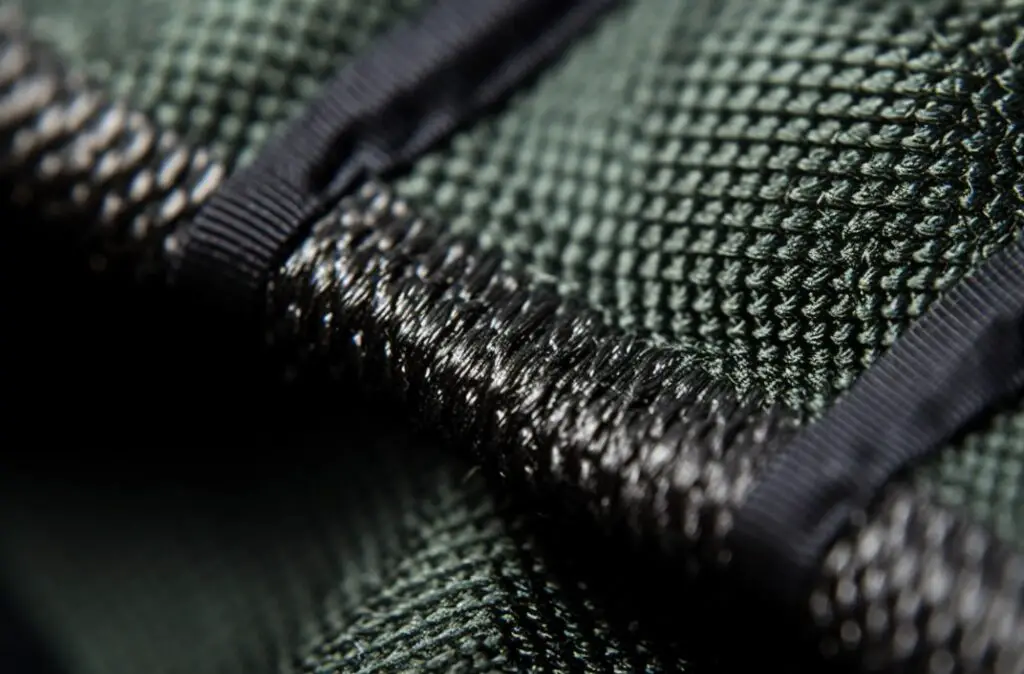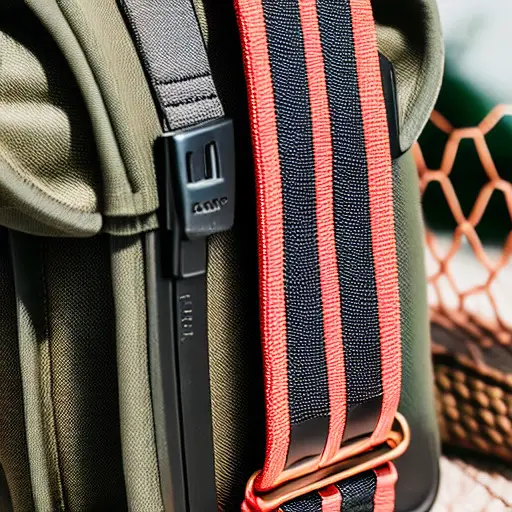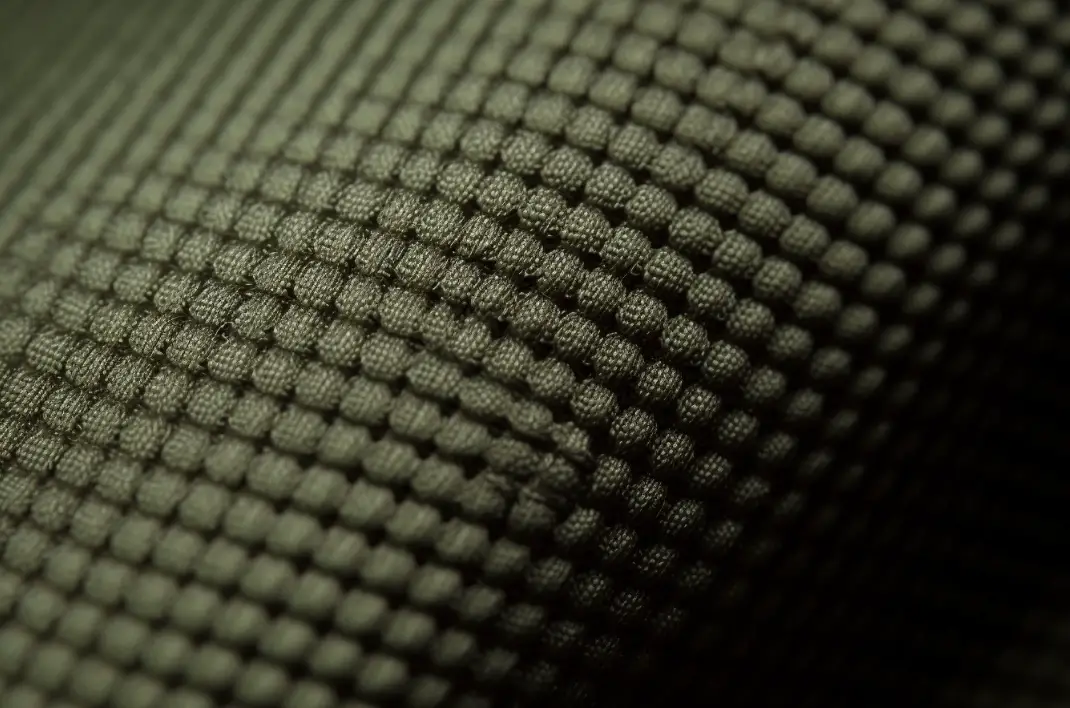900D material is a durable and high-quality fabric used in various applications, including luggage, backpacks, and outdoor gear.
When talking about “900D”, polyester or nylon or variants of these two synthetic fabrics are often ment.
These have many charactereistics in common, so we will adress them as one in this post.
Both are known for excellent abrasion resistance and water resistance, making 900D an ideal choice for products such as backpacks that require durability and protection from the elements.
In this blog post, I will share my personal experience and knowledge of 900D material, exploring its features, benefits, and applications in-depth.
Contents
A Brief History of 900D Material
Origins and Development
900D material is part of a larger family of fabrics most commonly used in the nylon variant known as Cordura®.
Cordura® fabrics were first developed by the DuPont Company in the 1920s, initially for use in military applications such as tires, parachutes, and body armor.

Over the years, Cordura® has evolved into a range of fabrics with varying denier counts, including 900D.
Denier, or “D,” is a unit of measure for the linear mass density of fibers, indicating the thickness and durability of a fabric.
A higher denier count generally means a thicker, stronger material. 900D material has a denser weave and higher durability than lower denier fabrics such as 420D or 600D.
Characteristics of 900D Material
Durability and Abrasion Resistance
One of the key features of 900D material is its exceptional durability and abrasion resistance.
Thanks to its high denier count and tight weave, this fabric can withstand a significant amount of wear and tear without showing signs of damage. This makes it an ideal choice for products that are subject to constant use and require a long-lasting material.
Water Resistance
Another crucial characteristic of 900D material is its water resistance. While not entirely waterproof, the dense weave of the fabric helps to repel water and prevent it from penetrating the material. This makes 900D suitable for use in outdoor gear and other products that may be exposed to wet conditions.
Lightweight and Flexible
Despite its durability and high denier count, 900D material remains relatively lightweight and flexible. This makes it easy to work with in manufacturing and ensures that products made from this fabric are comfortable to wear and use.
Applications of 900D Material
Luggage and Backpacks
One of the most common uses for 900D material is in luggage and backpacks.
Its durability and water resistance make it perfect for these applications, as it can withstand the rigors of travel and protect belongings from the elements.

Additionally, its lightweight nature ensures that luggage and backpacks made from 900D material are not overly heavy, making them easy to carry.
Outdoor Gear
900D material is also often used in outdoor gear such as tents, tarps, and camping equipment. Its durability and water resistance make it ideal for these applications, as it can withstand harsh conditions and protect users from the elements.
Military and Tactical Equipment
As mentioned earlier, Cordura® fabrics, including 900D material, were initially developed for military use. Today, 900D material is still used in various military and tactical applications, including body armor, pouches, and bags. Its durability and water resistance make it an excellent choice for these demanding applications.
Comparing 900D Material to Other Fabrics
900D vs. Lower Denier Fabrics
When compared to lower denier fabrics such as 420D or 600D, 900D material is significantly more durable and abrasion-resistant. This makes it a better choice for applications that require a higher level of durability and protection. However, lower denier fabrics may be more suitable for applications where weight and flexibility are more important than durability.
900D vs. Higher Denier Fabrics
Higher denier fabrics, such as 1000D or 1680D, are even more durable and abrasion-resistant than 900D material. However, they are also heavier and less flexible, which may make them less suitable for certain applications. 900D material offers a good balance between durability and weight, making it a versatile option for many uses.
Caring for 900D Material
Cleaning and Maintenance
To keep your 900D material products looking and performing their best, it’s essential to clean and maintain them properly. Most 900D material items can be spot cleaned with mild soap and water or wiped down with a damp cloth. Avoid using harsh chemicals or abrasive materials, as these can damage the fabric.
Repairing 900D Material
If your 900D material item becomes damaged or develops a tear, it can often be repaired using a fabric patch or sewing. This can help extend the life of your product and maintain its durability and water resistance.
Conclusion
In conclusion, 900D material is a highly durable, water-resistant, lightweight, and versatile fabric that is perfect for use in luggage, backpacks, outdoor gear, and military applications.Here are ten essential facts about 900D material:
1. 900D material is part of the Cordura® fabric family.
2. It was initially developed by the DuPont Company for military use.
3. The “D” in 900D stands for “denier,” a measure of a fabric’s thickness and durability.
4. 900D material is highly durable and abrasion-resistant.
5. It is water-resistant but not entirely waterproof.
6. This fabric is lightweight and flexible despite its high denier count.
7. Common applications include luggage, backpacks, outdoor gear, and military equipment.
8. 900D material offers a good balance between durability and weight when compared to lower and higher denier fabrics.
9. To care for 900D material, clean it with mild soap and water or a damp cloth.
10. Damage to 900D material can often be repaired with a fabric patch or sewing.
FAQs
What does D stand for in nylon?
D stands for “denier” in nylon, which is a unit of measurement used to describe the thickness or weight of the nylon fibers.
What does D mean in fabric?
In fabric, D typically refers to the denier, which is a unit of measurement for the weight and thickness of yarn or fibers. The higher the denier, the thicker and stronger the fabric.
What is 20D ripstop nylon?
20D ripstop nylon is a lightweight and durable fabric that is commonly used in outdoor gear such as tents, backpacks, and sleeping bags. The “20D” refers to the thickness of the individual fibers in the fabric, which are woven together in a ripstop pattern to prevent tearing and increase durability.
Which is thicker 300D or 600D?
600D is thicker than 300D. The “D” in both terms stands for denier, which is a unit of measurement for the thickness of fibers. A higher denier number means thicker fibers and a more durable fabric. Therefore, 600D fabric is thicker and more durable than 300D fabric.
Is 600 denier good?
- denier is a common and durable fabric weight for items such as backpacks, luggage, and outdoor gear. It is considered good for its strength and resistance to wear and tear.
What does 900 d mean?
- d typically refers to the denier of a fabric or material, which is a unit of measurement for the thickness and weight of fibers. A higher denier number indicates a thicker and heavier material.




